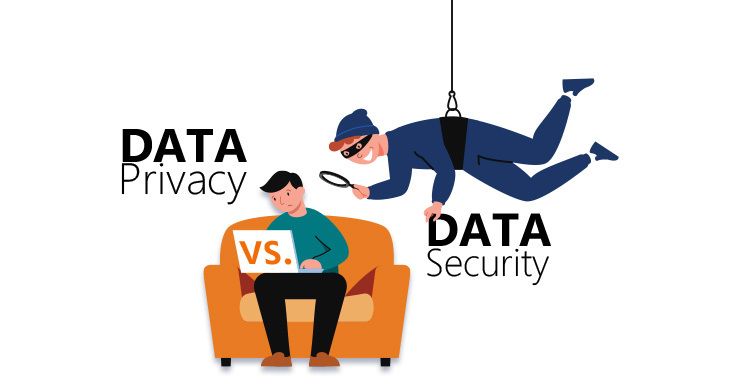Data Privacy vs Data Security
Data security and privacy are popular within data security regulations that impose strict penalties on companies that ignore ongoing threats from cyber attacks such as malware and intruders. But even some IT professionals aren't clear about the difference between data privacy and data security.

The importance of cybersecurity has grown exponentially over the last decade. Today, data security and privacy are popular within data security regulations that impose strict penalties on companies that ignore ongoing threats from cyber attacks such as malware and intruders. It's still the hottest topic for IT professionals. But even some IT professionals aren't clear about the difference between data privacy and data security. This week's blog post explains the similarities and differences between these terms.
What Is Data Privacy?
Privacy ensures that unauthorized parties do not have access to your information and that you continue to control your personally identifiable information (PII). Therefore, Data privacy primarily deals with procedures and policies governing the collection, storage, and use of PII and proprietary company information such as trade secrets, personnel, and internal processes. PII is highly confidential because of the civil and criminal liability companies and individuals face if improper disclosure is allowed overtly or due to unintended data security breaches.
To ensure privacy, you need more than a specific technology or set of technologies. This includes training all employees who have access to sensitive data about approved data protection processes. Just as airline pilots use checklists to ensure that essential items are checked before a flight and monitored during flight, IT professionals must also be willing to use privacy policies and other resources to protect PII and other sensitive information. In particular, to ensure privacy, IT professionals must have a set of policies, and processes detailing how organizations and their employees collect, store, and use sensitive data on all systems. This privacy policy aims for all employees to recognize the importance of privacy, understand how to prevent inappropriate disclosure of information, and deal with privacy issues and policy violations.
Data breaches are no longer just embarrassing or inconvenient for businesses. Currently, privacy laws such as GDPR impose penalties for failing to protect the privacy of PII and other sensitive personal information. These compliance standards may impose financial penalties and criminal charges for PII's intentional and, in some cases, unintentional disclosures. GDPR imposes privacy standards and legal requirements on all companies that store or process the personal information of EU residents.
What Is Data Security?
Data security uses physical and logical strategies to protect information from data breaches, cyber-attacks, and accidental or intentional data loss. Specifically, technologies and techniques used to prevent:
- Unauthorized access
- The deliberate loss of sensitive data
- Accidental loss or corruption of sensitive data
Examples of measures to ensure data security include data encryption, both at rest and in transit, and physical and logical access control to prevent unauthorized access. Specific techniques include multi-factor authentication, multiple layers of network and application-level access control, and detection and isolation of rogue devices after connecting to the network. Regular backups and a proven disaster recovery plan are essential parts of data security.
In short, data security is based on a technically sophisticated and comprehensive approach to protecting all networks, applications, devices, and data stores within an enterprise IT infrastructure.
Data Privacy vs Data Security
The best way to understand the difference between data security and privacy is to look at the mechanisms used in your data security and privacy policies. Privacy policies control how data is collected, processed, and stored. While your organization's data security is more robust, detailing physical and logical controls to secure data. The way you collect, store, or distribute that data can violate your privacy policy. For example, enterprises can ensure that sensitive information is encrypted, masked, and restricted adequately to authorized parties. However, improper collection of this data, such as not obtaining informed consent from the data owner before collecting the data, does not change the security of the data but violates data privacy rules.
Conclusion
Implementing a privacy policy system is no longer just an admirable goal, given what's at stake for organizations that are outsourced to PII for their customers and employees. This is a mission-critical aspect of an organization's information security framework and operations. Best security practices were implemented before privacy regulations were enacted. Today, data protection security systems directly impact most organizations' risk management strategies. Protecting data privacy and security should be a priority for all employees, not just IT professionals.
